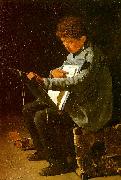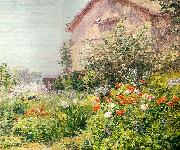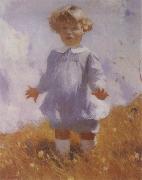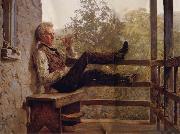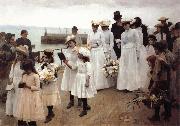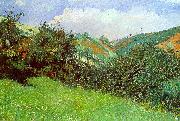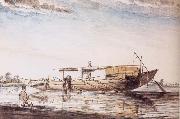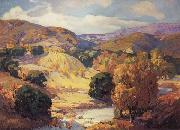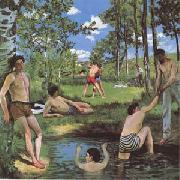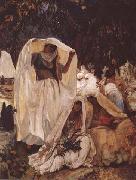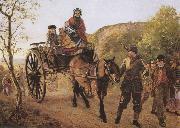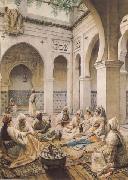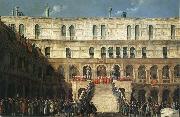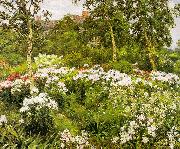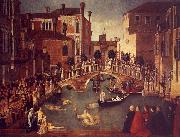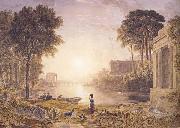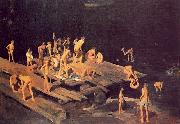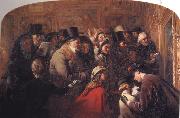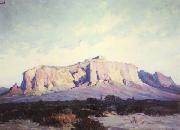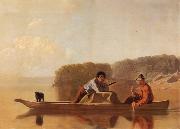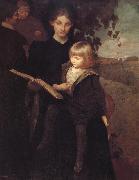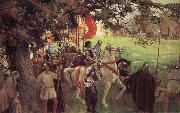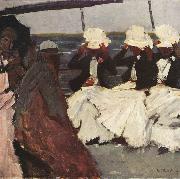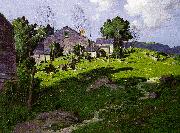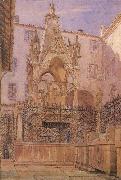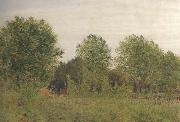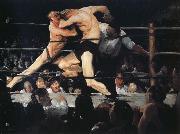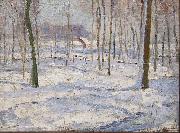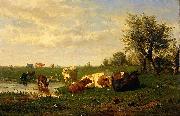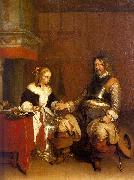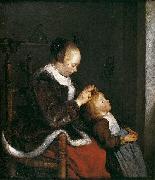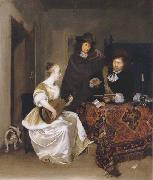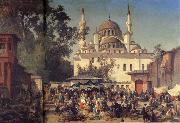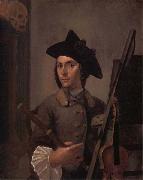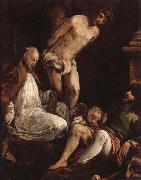|
|
|
|
|
|
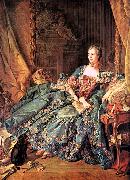 |
Francois Boucher
|
|
François Boucher (29 September 1703 - 30 May 1770) was a French painter, a proponent of Rococo taste, known for his idyllic and voluptuous paintings on classical themes, decorative allegories representing the arts or pastoral occupations, intended as a sort of two-dimensional furniture. He also painted several portraits of his illustrious patroness, Madame de Pompadour.
|
|
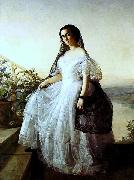 |
Francois-Auguste Biard
|
|
(June 30, 1799 - June 20, 1882) was a French genre painter.
Born at Lyon, he traveled around the world, sketching on the way. He was particularly successful in rendering burlesque groups.
His painting, Scenes on the Coast of Africa, depicted on the right, was the inspiration behind Isaac Julien's short film The Attendant (1993). Biard was a known abolitionist against the Atlantic slave trade.
Wikimedia Commons has media related to: Auguste François Biard
This article incorporates text from the public domain 1907 edition of The Nuttall Encyclopædia.
|
|
|
|
|
|
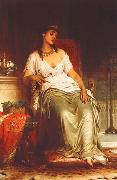 |
Frank Bernard Dicksee
|
|
(b. London, 27 November 1853 - 17 October 1928) was an English Victorian painter and illustrator, best known for his pictures of dramatic historical and legendary scenes. He also was a noted painter of portraits of fashionable women, which helped to bring him success in his own time.
Dicksee's father, Thomas Dicksee, was a painter who taught Frank as well as his brother Herbert and his sister Margaret from a young age. Dicksee enrolled in the Royal Academy in 1870 and achieved early success. He was elected to the Academy in 1891 and became its President in 1924. He was knighted in 1925, and named to the Royal Victorian Order by King George V in 1927.
Dicksee painted the piece 'The Funeral of a Viking' in 1893, which now resides in Manchester City Art Gallery, having been there since 1928 when it was presented by Arthur Burton ESQ in memory of his mother to the Corporation of Manchester. Victorian critics gave it both positive and negative reviews, for its perfection as a showpiece and for its dramatic and somewhat staged setting, respectively. The painting was used by Swedish Viking/Black metal band Bathory for the cover of their 1990 album, Hammerheart.
|
|
|
|
|
|
|
|
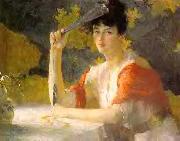 |
Frank Weston Benson
|
|
(March 24, 1862 - November 15, 1951) was an American Impressionist artist, and a member of the Ten American Painters.
Benson was born in Salem, Massachusetts. In 1879, he began study at the School of the Museum of Fine Arts, Boston under Otto Grundmann, and later at the Acad??mie Julian in Paris. Upon return to America, he would become an instructor at the School of the Museum of Fine Arts, Boston. Some of his best known paintings (Eleanor, Museum of Fine Arts, Boston; Summer, Rhode Island School of Design Museum) depict his daughters outdoors at Benson's summer home on the island of North Haven, Maine. He also produced numerous paintings and etchings of wildfowl.
Born into a successful merchant family, Benson lived in Salem for most of his life. At the Boston Museum school he befriended Edmund Charles Tarbell and Robert Reid, at the same time teaching drawing classes in Salem and painting landscapes during the summer. In 1883 he began his studies in Paris, and in the summer of 1884 painted at Concarneau, along with Willard Metcalf and Edward Simmons. His early paintings were conventional landscapes. |
|
|
|
|
|
|
|
|
|
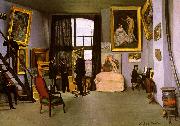 |
Frederic Bazille
|
|
b.Dec. 6, 1841, Montpellier, France
d.Nov. 28, 1870, Beaune-la-Rolande
French
Frederic Bazille Galleries |
|
|
|
|
|
|
|
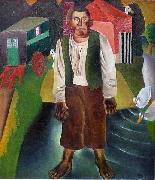 |
Frits Van den Berghe
|
|
(3 April 1883 - 22 September 1939) was a Belgian expressionist painter.
He was born at Ghent. Like his friends Constant Permeke and Gustave De Smet, he first adopted the late-impressionist style of Emile Claus, but converted to expressionism during World War I.
|
|
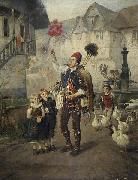 |
Fritz Beinke
|
|
(1842- 1907 ) - Painter
painted The toymaker of Nuremberg in 1882 |
|
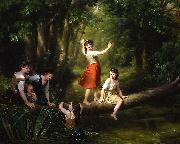 |
Fritz Zuber-Buhler
|
|
was a Swiss painter integrant of the style Academic Classicism, born in 1822 at Le Locle in Switzerland and died November 23, 1896.
At sixteen years old he moved to Paris, France where found his first teacher Louis Grosclaude. Later he studied at the École des Beaux-Arts and then refined his technical skills with François-Édouard Picot, who followed the same lineage of contemporaneous artists such as Leon Perrault, Bouguereau, Alexandre Cabanel and many others. Afterwards he spent some time in Italy searching for inspiration and raise the quality of his art. Then, returning to Paris, he made his debut at the Salon in 1850 exhibiting alongside oil paintings, drawings, pastels and watercolors.
His painting Innocence shows his romantic view of the peasant childhood and their environments, expressing nature, softness and intense details. Also his works were drawn by popular themes at that period like mythology, religion and requested portraits. Zuber-Buhler produced exhibitions in the United States, comprising at the Pennsylvania Academy of the Fine Arts and achieved great admiration as a classic academic painter. |
|
|
|
|
|
|
|
|
|
|
|
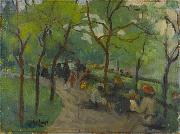 |
George Benjamin Luks
|
|
(August 13, 1867-October 29, 1933) was an American realist artist and illustrator. His vigorously painted genre paintings of urban subjects are examples of the Ashcan school in American art.
Luks was born in Williamsport, Pennsylvania, to Central European immigrants. His father was a physician and his mother was an amateur painter and musician.The Luks family (George, his parents and five siblings) eventually moved to Pottsville, in Southern Pennsylvania near the coal fields. In this setting, he learned at a young age the importance of compassion by watching how his parents helped the coal miners' families, and many believe that this is the reason why lower class New Yorkers were often Luks's subject matter. Luks studied at the Pennsylvania Academy of Fine Arts before he traveled though Europe where he attended several art schools. Later he went to Desseldorf where he lived with a distant relative, a retired lion-tamer. He abandoned Desseldorf for the more stimulating spheres of London and Paris. He then returned to Philadelphia in 1893 where he was an illustrator for the Philadelphia Press where he met John Sloan, William Glackens, and Everett Shinn. They would meet at the studio of Robert Henri, an artist who emphasized the depiction of ordinary life, shunning genteel subjects and painting quickly. The group became known as the "Philadelphia Five". In 1896, Luks moved to New York and began his art career there as the premier humorist artist for the New York World. During his time as an illustrator there, he lived with William Glackens. |
|
|
|
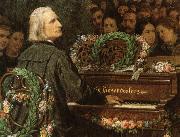 |
george bernard shaw
|
|
Born: 26 July 1856
Birthplace: Dublin, Ireland
Died: 2 November 1950 (natural causes)
Best Known As: The author of Pygmalion |
|
|
|
|
|
|
|
|
|
|
|
|
|
|
|
|
|
|
|
|
|
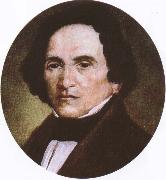 |
georges bizet
|
|
Born: Oct 25, 1838 in Paris, France
Died: Jun 03, 1875 in Bougival, France
Active: '30s, '50s, '70s-2000s
Major Genres: Music, Theater
Career Highlights: Carmen, Carmen Jones, Carmen
First Major Screen Credit: The Burlesque on Carmen (1916)
|
|
|
|
|
|
|
|
|
|
|
|
|
|
|
|
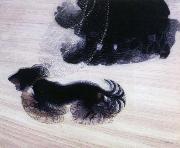 |
giacomo balla
|
|
Balla is often portrayed as a painter closely associated with Italian Futurism although in fact, like a number of others associated with the group, his work crossed into a number of creative disciplines including fashion and the applied arts. In 1914 he wrote the Manifesto on Menswear, later retitled Antineutral Clothing, a dramatic exhortation to dispense with the mundaneity of everyday menswear in favour of dynamic, expressive, and aggressive Futurist clothing. Like his fellow Futurists he sought to sweep away all vestiges of Italy cultural heritage in favour of an emphatically 20th-century way of life. He conceived of Futurist menswear as allowing its wearers to respond to mood changes through pneumatic devices that can be used on the spur of the moment, thus everyone can alter his dress according to the needs of his spirit. It could also be animated by electric bulbs. He had an exhibition at the Casa DArte Bragaglia in Rome in 1918, in conjunction with which he co-published his Colour Manifesto. He was also committed to Futurist applied arts and furniture, brightly painted and with richly animated surfaces, and showed them at his Futurist House in 1920, the year in which he collaborated on the journal Roma futurista. He also exhibited at the Paris Exposition des Arts D??coratifs et Industriels of 1925 and the International Exhibition at Barcelona in 1929. However he failed to get his Futurist designs put into mass production and during the 1930s gradually distanced himself from such an outlook. |
|
|
|







